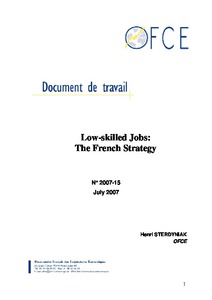Low-skilled jobs: the French strategy
"Since 1995, French governments implemented a specific strategy aiming at lowering unemployment or inactivity of so called unskilled workers, in fact of low wage workers. This strategy used two tools: cuts in employers’ social contributions reduce companies’ costs for hiring low-wage workers; t...
| Main Author: | |
|---|---|
| Institution: | ETUI-European Trade Union Institute |
| Format: | TEXT |
| Language: | English |
| Published: |
Paris
2007
OFCE |
| Subjects: | |
| Online Access: | https://www.labourline.org/KENTIKA-19291895124910190779-Low-skilled-jobs-the-French-st.htm |
| Summary: | "Since 1995, French governments implemented a specific strategy aiming at lowering unemployment or inactivity of so called unskilled workers, in fact of low wage workers. This strategy used two tools: cuts in employers’ social contributions reduce companies’ costs for hiring low-wage workers; the Prime Pour l’Emploi, PPE, raises low-wage workers’ incomes, and increases the gap between wage and assistance benefits in order to increase incentives for low-wage workers to take a job. The paper provides a description of the situation of unskilled workers in France. It describes the history of measures lowering employers’ contributions on low wages, presents and discusses the studies that have tried to assess the impact of such measures on employment. These cuts cost approximately 18 billion euros in 2007. An average estimate of about 550,000 jobs created would have an ex post cost of 9 billion euro, i.e. 176,000 euros per created job. The history and the structure of the PPE are presented. According to existing studies, the PPE would not have a significant effect on labour supply. Should it be concluded from it that there is not inactivity trap? Or, on the contrary, that the trap is very deep? The current debate on the appropriateness to maintain employers’ contribution and PPE or to reform them is addressed." |
|---|---|
| Physical Description: | 29 p. Digital |

